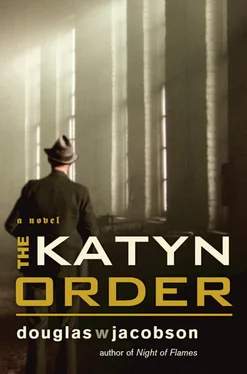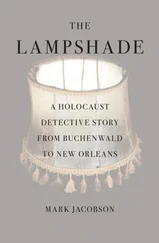“And that matters to you, Captain Andreyev?” The pistol was at her side, and she tightened her grip on it. “The fate of Poland matters to you?”
Andreyev got to his feet, but Natalia stood her ground. “It mattered to Kovalenko,” Andreyev snapped. “And he mattered to me. I’m sorry about your family. I’m sorry about what happened in Warsaw and in the Katyn Forest. I’m sorry about the whole damn war, but that doesn’t change what’s important now. What’s important now is to find that copy of the order and—”
“What’s important to me,” Natalia retorted, “is to find Adam Nowak.”
Andreyev nodded. “Very well, then. I suggest we get started. Do you know where he went?”
Natalia turned to Rabbit again, thankful that her friend was there. She had decided to trust Andreyev because she had no other choice. But she felt a great comfort having someone beside her that she knew she could rely on, someone she trusted without question.
Rabbit was silent but his eyes communicated agreement. Natalia continued. “Adam made contact with someone who told him that Banach is with the Górale in the Tatra Mountains, somewhere beyond Nowy Targ. Adam went up there to find him, but he should have come back by now. His contact has also disappeared.”
Andreyev’s expression hardened. “His contact is probably dead by now. But Tarnov would have beaten the information out of him before he killed him.”
Natalia glanced at her watch. It was quarter to four. “We should go to Nowy Targ this afternoon and try to make contact with the Górale.”
“Tarnov will have men watching the bus station,” Andreyev said.
“Can you get an auto?”
Andreyev thought for a moment then nodded. “I’m here unofficially, but I have a few resources I can access. I’ll meet you back here in one hour.”
21 JUNE
THE DRIVE UP TO NOWY TARG took longer than they expected, and Natalia grew more apprehensive with each agonizingly slow kilometer. Andreyev did the best he could, maneuvering the Russian GAZ-11 through the narrow, winding roads, at one point darting past a battered, rusted truck laden with sacks of grain and coming so close to the edge of the road that Natalia thought it would all end right there. Rabbit, of course, thought it was great sport.
The city appeared quiet as they crossed a bridge over the Bialy River, and proceeded along twisting cobblestone streets lined with three-story, stucco buildings. Natalia guessed most of the locals were home having their supper. They parked the auto behind the bus station—a drab, brown building, with peeling paint and boarded up windows—and set out on foot. As they passed the front of the station, the dozen or so people standing in line at a bus stop eyed them curiously. In a small, remote city like this outsiders easily attracted attention, and Natalia felt more than a little conspicuous, especially walking down the street with a Russian officer. At least Andreyev wasn’t in uniform, though the GAZ-11 they drove into town was a dead giveaway.
Farther down the street they spotted a pub. It was a chalet-style structure of stone and white stucco, with a steep, wood-shingled roof. The door was open, and Natalia heard voices from inside. “As good a place to start as any,” she said.
Inside, the room was long and narrow, with a copper-topped bar on the left and a half-dozen round, wooden tables along the right. A scattering of pictures, mostly faded prints of mountain landscapes, hung haphazardly above the tables. A ceiling fan creaked overhead, and a stuffed boar’s head glared at them from the wall behind the bar, yellow teeth clenched around a limp rabbit.
“I hope I don’t end up like that,” Rabbit whispered to Natalia, jerking his thumb toward the boar’s head.
The only other patrons were two young men wearing dark trousers and matching green shirts, like uniforms of some sort, who sat at the far end of the bar with mugs of beer, conversing with the bartender. They both shot quick glances at the trio entering the bar, then turned back to their beers. Andreyev motioned toward one of the tables, and the three of them sat down. The table was low, with barely enough room to slide their legs under it. Andreyev sat facing the door.
After a bit more conversation with the two men, the bartender wiped his hands on a cloth, then walked around the bar to their table. He was in his sixties, Natalia guessed, slightly built and practically bald with wisps of gray hair around his ears and the back of his head. He smiled politely when Natalia ordered three cups of coffee and returned to the bar. They’d had some discussion ahead of time about who should do most of the talking. It could appear odd for a woman to be the one asking questions when a man was present, but with Andreyev’s Russian accent, it seemed the better risk.
The bartender returned and set the coffee cups on the table. “Anything else?” he asked. “We have vegetable soup tonight.”
Natalia spoke up, reciting the question they had also discussed ahead of time. “We were expecting to meet someone here, but we were delayed along the way. His name is Tytus; do you know him?”
The bartender’s eyes were blank, his expression unreadable. “No, sorry, no one by that name.” He walked back to the bar with a slightly quicker step and rejoined his friends.
Natalia sipped the coffee slowly, trying hard not to choke. It was even worse than the bitter, ersatz concoctions served in Krakow and smelled earthy, as though brewed from tree roots. “I’m sorry, did you want some soup?” she asked Rabbit. The boy was always hungry.
“Nah, not from here,” he replied. “I don’t trust that guy.”
“An intelligent observation,” Andreyev said quietly.
“Especially considering the auto we drove into town,” Natalia said.
The three of them continued in trivial bits of conversation to pass the time, having decided to wait for twenty minutes before moving on to another place.
They didn’t have to wait that long. One of the men wearing the green uniform shirt polished off his beer, got up and left through a rear door.
“He’ll be back,” Andreyev said.
“Should I follow him?” Rabbit asked eagerly. “He’d never spot me. I’m good at that.”
Andreyev shook his head. “We all stay together. Let’s see how this plays out.”
Andreyev had changed clothes back in Krakow when he’d gone to get the auto. Instead of the pin-striped suit, he now wore gray slacks, a black turtleneck sweater and a short, lightweight leather jacket. He carried a pistol in an ankle holster under his right trouser pant.
Natalia sat facing the rear of the bar, and the hair on the back of her neck bristled when the same man returned ten minutes later. Instead of taking his seat at the bar, however, he stood in front of the rear door with his arms folded over his chest. He now wore a black denim jacket over the green shirt. She assumed he was armed.
A moment later, Andreyev tensed and slowly slid his hands off the table. His right foot scraped softly along the wooden floor.
Two other men stepped through the front door. They both wore the same green shirts under black denim jackets.
One of the men pulled the door closed and stood in front of it. The second man approached their table. He was young, in his mid-twenties Natalia thought, tall and broad-shouldered with short blond hair. He had hard, blue eyes, and he fixed them directly on Andreyev. “Why are you looking for Tytus?” he asked.
“Are you Tytus?” Natalia asked.
He ignored her and pointed at Andreyev. “I want you to answer the question.”
Andreyev sat with his back ramrod straight, his hands still under the table. “We need his help.”
Читать дальше












